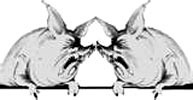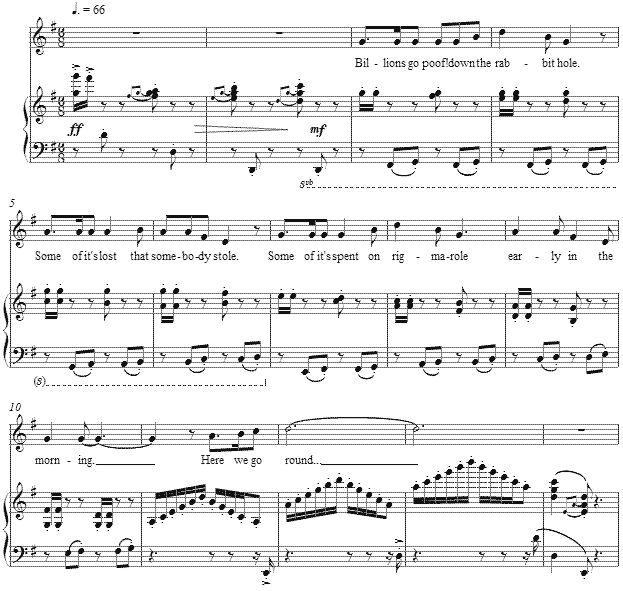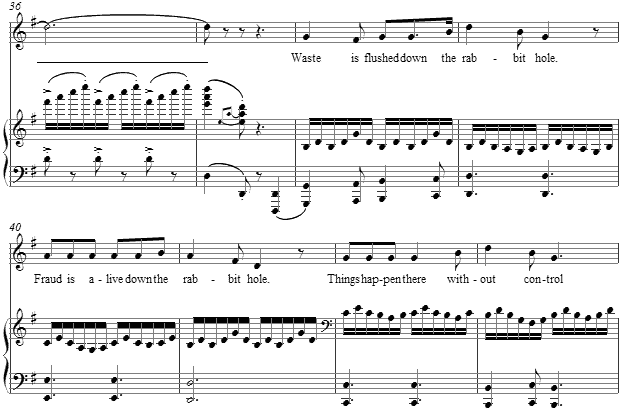Music and Texts of GARY BACHLUND
Vocal Music | Piano | Organ | Chamber Music | Orchestral | Articles and Commentary | Poems and Stories | Miscellany | FAQs
Chump Change - variations on Mulberry Bush - (2009)
Gary Bachlund
for high voice and piano
Billions go poof! down the rabbit hole.
Some of it's gone that somebody stole.
Some of it's spent on rigmarole,
Early in the morning.
Here we go round...
Someone's corrupt down that rabbit hole,
Far, far beyond an audit's patrol.
Some of the cash has gone for a stroll,
Early in the morning.
Governments dump in the rabbit hole.
Someone cleans up in that rabbit hole.
Someone gets wealthy from what they stole
Early in the morning.
Here we go round again....
Waste is flushed down the rabbit hole.
Fraud is alive down the rabbit hole.
Things happen there without control
Early in the morning.
Round and round,
Where she stops,
Nobody knows.
The buck stops here.
There's quid pro quo down the rabbit hole,
Funneling back through the lobbyists' role.
Folks skim the cream from the rabbit hole
Early in the morning.[ 4 pages - circa 2' 10" ]
Pigs in a Barrel
The first phrase came from an editorial comment documenting government waste. In the recent national discussions over health insurance reform, it has been asserted that an enormous sum can be "saved" by eliminating "waste and fraud." But this rhetoric has been repeated ever since my own experiences with politics began, and asserted by Democrats and Republicans alike, with one commonality between them; "waste and fraud" have been politicized for decades and yet "waste and fraud" continue and increase under both parties.
In an age when nations throughout the world are awash in "public" debt, one need recall wisdom which has existed far earlier in history than the illogical "noise" of modern politics. French economist, statesman and author Frederic Bastiat (1801-1850) noted with accuracy which grows greater with the passage of the years, "When plunder becomes a way of life for a group of men living together in society, they create for themselves in the course of time a legal system that authorizes it and a moral code that glorifies it."
English author, George Bernard Shaw (1856-1950) observed, "A government that robs Peter to pay Paul can always depend upon the support of Paul." Lest such comments seem too contemporary for the skeptic of my skepticism in government, let us note that Aristotle noted, "To the size of the state there is a limit, as there is to plants, animals and implements, for none of these retain their facility when they are too large."
Across millennia and across the borders of nations and societies, one truth emerges -- government becomes too large, and as such becomes corrupted. "Fraud and waste" is a phrase repeated by opposition parties as accusations against the other, and yet it continues and grows. Why? The always denied "quid pro quo," or as Jesse Unruh, Speaker of the California State Assembly from 1961-1969, stated, "Money is the mother's milk of politics."
This same view in other words comes from an earlier time, when Thomas Paine (1737-1809) argued, "We still find the greedy hand of government thrusting itself into every corner and crevice of industry, and grasping at the spoil of the multitude. Invention is continually exercised to furnish new pretenses for revenue and taxation. It watches prosperity as its prey and permits none to escape without a tribute." We need recall that Paine was among the American revolutionaries, in a revolution against government. Today's fashionable revolutionaries are revolutionaries for growth of government -- which turns the meaning of the word on its head -- and makes the modern revolutionary merely in service to those who feed on the "fraud and waste" which grows under all political parties.
The notion of waste was well disparaged by Thomas Edison, who stated, "Waste is worse than loss. The time is coming when every person who lays claim to ability will keep the question of waste before him constantly. The scope of thrift is limitless." Shall we expect waste and fraud to be rooted out of the political sphere of influence? If not, why not? The only answer comes to Jesse Unruh's comment as above.
The form is a set a variations on the child's rhyme in song, "Here we go round the Mulberry bush." Certainly politics is a most earnest game when it is about money, as this politics runs around in its own dizzying circles generating an emotional frenzy to obscure "waste and fraud" on which it in part feeds itself. The first variation states the melodic theme to an undercurrent of a "Jaws" like bass line.
Another variation accompanies with "My Country 'tis of thee" as the bass line, though my thought to this melody and rhyme also reflects Ambrose Bierce's A Rational Anthem, showing that skepticism of government can be found throughout poetry across centuries.
That waste -- and the pun is intended -- is "flushed" down the rabbit hole is accompanied with a reference from Bedřich Smetana's Moldau in its major variation.
The last stanza slows the tempo for a small delicato section as one answers the continual denial from politicians that "there is no quid pro quo." Of course there was, is and will be, as long as there are politicians. A coda follows this stanza with an up tempo reprise of the opening verse.
The score for Chump Change is available as a free PDF download, though any major commercial performance or recording of the work is prohibited without prior arrangement with the composer. Click on the graphic below for this piano-vocal score.




